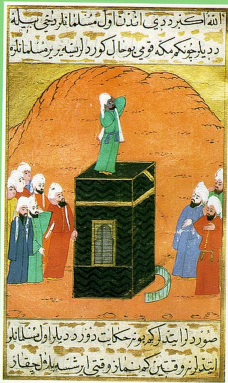Destur Medat Sheykh Lokman Efendi HZ

As I am writing this, snow is falling outside my window in large cotton wool clumps, slowly covering the streets and the cars, and weighing down pine tree branches with layer upon layer of pure white. Upstate New York still feels like a foreign place for me, a transplanted Californian, who now calls the Dergah and this way home, more than any specific state or country. I’ve been here a little over a year and a half and been through one winter, which was long, but relatively painless except for one freak snowstorm in May that left us without power or heat for a couple of days. Sheykh Lokman Efendi HZ said it was good practice for hard times that may come when we least expect it, and I echoed that to myself, as I worried about when the house would be warm again. With our Sheykh’s himmet, it wasn’t long before the wires were all repaired and summer finally showed up fashionably late, yet beautiful.
Where I come from, it doesn’t snow, except very lightly in some eastern mountains, about an hour outside of the city. In fact, the region is (like all of Southern California) a desert, though the people who settled and developed it would have you believe otherwise. They transformed it into a “Mediterranean” paradise on earth; a place that has come to signify wealth, beauty, gratuity, and desire. They did the landscaping to match all that: palm trees, luxurious flowering plants, exotic tropicals, and lots of green grass, all impostors sucking up the scarce imported water to maintain an elaborate mirage. As a person who has worked with plants for years and always loved them, this constructed “Eden” had its benefits, however like all fake and contrived things, the image cracks up close. It turns out that all those exotic species need even more water to thrive in a desert environment and this particular desert is prone to catching fire on a regular basis. This forces the inhabitants to rebuild the mirage, which they do vigorously, while also never learning their lesson: that you can’t make a lasting paradise on earth to suit your whims, there’s larger divine laws ruling over mankind’s eager construction. Perhaps one of the most poignant realizations I had living there was that some plants actually need to freeze, to thrive. The fake desert paradise couldn’t even live up to its own hype, some things just simply wouldn’t grow there despite all their claims to the contrary. Yes friends, the cold is like a secret key to some of the most beautiful trees and bountiful crops that cover our tables in the height of summer; no buds set to make flowers and then form fruit without a biting cold that puts all warmth in its grave.
Sheyhk Efendi always reminds us that the cold and snow bring their own gifts to the believer. Just as we revel in the spring and summer and the visible, dramatic color changes of fall, the winter is something we must come to value as an opportunity to make teffekur. He tells us it is a mercy that humans are compelled to cover themselves in the cold. It’s a simple and natural way to run away from sin: from showing too much and seeing too much in these times when the entire world seems to want to flaunt all of their secrets. Everyone happily wears a burka when it’s 10 below zero. It’s a time to stay inside and not be busy with the outside world and the traps of dunya more than what is absolutely necessary. The cold has a way of ordering your priorities and reminding you of your smallness and weakness, two things which are essential to the perspective of a believer. The warmth of anger, of ego and nafs are not enough to survive a snowstorm and the freezing wind laughs at your stubbornness. The cold demands you break your addiction to control and false power; that you admit your own vulnerability and dependence upon Allah SWT for every facet of your existence and comfort.
Sheykh Efendi also tells how Sahib el- Seyf (KS) used to say the snow is the shroud that covers the earth: an icy keffin reminding us to reflect on death, to slow down, to contemplate by the wood stove, or the tea kettle, the impermanence of our mortal lives and the certainty of their end. How beyond this great sign is Allah SWT’s power to raise everything from that stiff cold into a burst of rapturous spring. That with this great power, Allah SWT will raise ALL things again. The very absence of green life becomes a reminder of it, of Allah’s promise to raise everyone and everything again on judgment day, so that we might complete the seasons of our journey back to Him SWT. May our graves be gardens upon our deaths and a restful place until that day when there is no shade. May we all be the thinking believers that reflect on such great signs given by our Sheykhs and may their stations be raised higher and higher, amin.
With the blessings and permission of our Sheyhh we end with the dua of the Holy Prophet AS:
اللَّهُمَّ اغْسِلْ خَطَايَاىَ بِمَاءِ الثَّلْجِ وَالْبَرَدِ، وَنَقِّ قَلْبِي مِنَ الْخَطَايَا، كَمَا يُنَقَّى الثَّوْبُ الأَبْيَضُ مِنَ الدَّنَسِ، وَبَاعِدْ بَيْنِي وَبَيْنَ خَطَايَاىَ كَمَا بَاعَدْتَ بَيْنَ الْمَشْرِقِ وَالْمَغْرِبِ
“O Allah! Wash away my sins with the water of snow and hail, and cleanse my heart from the sins as a white garment is cleansed of filth, and let there be a far away distance between me and my sins as You have set far away the East and the West from each other.”
Amin Allahuma Amin, Fatiha







